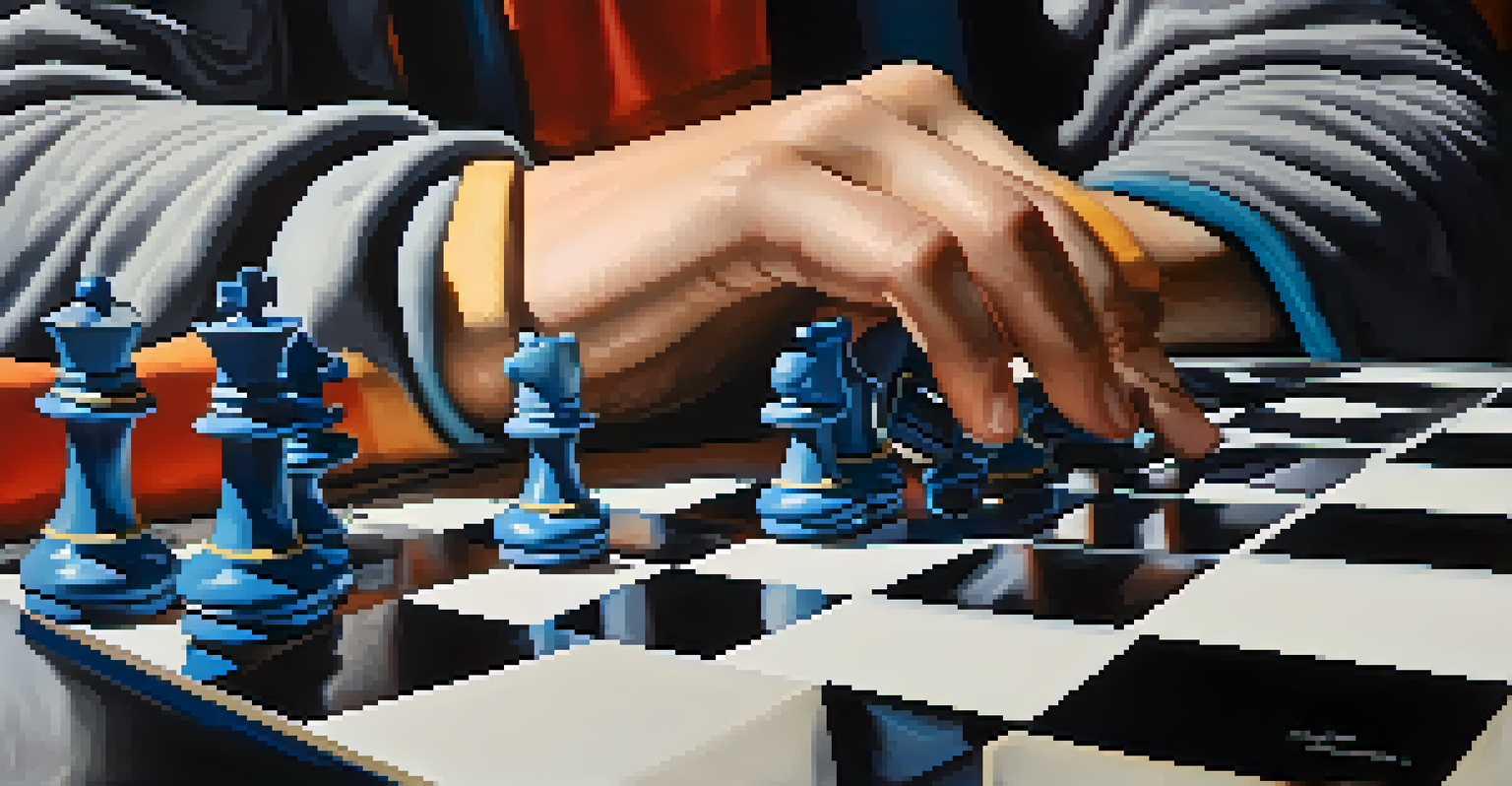Intuition vs. Logic: Balancing Instinct and Reasoning

Understanding Intuition: The Power of Gut Feelings
Intuition is often described as a gut feeling or instinctive response. It's that immediate sense you get when faced with a decision, often based on past experiences rather than detailed analysis. While some may dismiss it as mere guesswork, intuition can play a critical role in quick decision-making situations.
Intuition is the whisper of the soul.
For instance, a seasoned firefighter may instinctively know which route to take in a burning building, relying on years of experience rather than a calculated risk assessment. This kind of instinct is honed over time, reflecting a deep understanding of one's environment and circumstances. Intuition can be incredibly beneficial, especially in high-pressure scenarios where time is of the essence.
However, it's essential to remember that intuition isn't infallible. It can be influenced by biases and emotions, sometimes leading us astray. Therefore, while it's a powerful tool, it should be balanced with rational thought to ensure well-rounded decision-making.
The Role of Logic: Analyzing Information Methodically
Logic involves systematic reasoning and analysis, allowing us to evaluate situations based on facts and evidence. It’s the process we use to weigh pros and cons, consider potential outcomes, and make informed choices. By employing logic, we can minimize errors that arise from impulsive decisions driven by emotion.

An example of logical reasoning can be found in financial planning. A person might create a detailed budget, analyzing income and expenses to make sound investment choices. This methodical approach helps in identifying risks and opportunities, ensuring that decisions are grounded in reality rather than fleeting feelings.
Intuition Enhances Quick Decisions
Intuition can be a critical tool in decision-making, especially in high-pressure situations where immediate responses are necessary.
Nonetheless, over-reliance on logic can lead to paralysis by analysis, where a person becomes so engrossed in data that they struggle to make a decision. This highlights the need for a balance between logical reasoning and intuitive insights to navigate complexities effectively.
The Intersection of Intuition and Logic: A Dynamic Duo
Intuition and logic might seem like opposites, but they can work beautifully together. When combined, they create a more holistic decision-making process, leveraging the strengths of both approaches. This synergy allows us to act swiftly while ensuring our choices are grounded in rational thought.
The greatest minds are capable of the greatest vices as well as of the greatest virtues.
For example, a business leader might use their intuition to sense a shift in market trends while employing logic to analyze data and validate their gut feeling. This combination often leads to more innovative and effective strategies, as it encourages creativity along with critical thinking. In essence, intuition can spark ideas, while logic can refine and implement them.
Recognizing when to rely on each can be key. In some situations, instinct might provide the initial spark, while in others, a more analytical approach may be necessary to avoid pitfalls. The ability to switch between these modes is a valuable skill in both personal and professional realms.
When to Trust Your Intuition: Recognizing the Right Moments
There are situations where trusting your intuition can be particularly advantageous. Generally, these are moments when you have substantial experience or knowledge in a specific area. For instance, a chef may instinctively know how to adjust flavors without needing to measure every ingredient.
Moreover, intuition can shine in situations that require quick thinking, such as emergency scenarios or competitive environments. In these cases, relying on instinct can lead to immediate and effective actions. The key is to be aware of your emotional state, as heightened stress can cloud intuitive judgment.
Logic Ensures Informed Choices
Employing logic allows for systematic analysis and informed decision-making, minimizing errors driven by impulsive emotions.
However, trusting your intuition doesn't mean ignoring logic entirely. It's about recognizing when your instincts are likely to be reliable and when they should be supplemented with rational analysis. Developing this awareness takes practice but can lead to more confident decision-making.
When to Rely on Logic: Avoiding Emotional Pitfalls
While intuition has its place, there are times when logic should take the lead. Particularly in high-stakes decisions involving significant consequences, a logical approach can help mitigate risks. This is especially true in fields like law or medicine, where decisions must be supported by evidence.
For example, a doctor diagnosing a patient might lean on logical reasoning to analyze symptoms and medical history, ensuring a comprehensive understanding before making a conclusion. This method eliminates personal biases and emotional influences, leading to more accurate outcomes.
It's essential to recognize situations where emotions may cloud your judgment. When faced with significant life changes, such as a career shift or relationship decision, taking a step back to evaluate logically can provide clarity and direction. Balancing emotional awareness with rational thought can lead to more sound decisions.
Cultivating a Balanced Approach: Strategies for Decision-Making
Developing a balanced approach to decision-making involves cultivating both intuitive and logical skills. One effective strategy is to practice mindfulness, which enhances your awareness of gut feelings while also promoting clear thinking. This awareness can help you discern when to trust your instincts and when to lean on logic.
Additionally, journaling can be a powerful tool to reflect on past decisions. By analyzing how intuition and logic played roles in those choices, you can identify patterns and refine your decision-making process over time. This practice fosters personal growth and encourages a deeper understanding of your thinking style.
Balance Intuition and Logic
Finding a balance between intuition and logic can lead to better decision-making outcomes by leveraging the strengths of both approaches.
Seeking feedback from trusted friends or mentors can also provide valuable insights. They can help you evaluate your thought process, challenging you to consider both intuitive and logical perspectives. This collaborative approach nurtures a well-rounded decision-making framework.
Conclusion: Embracing the Balance for Better Decisions
In the dance between intuition and logic, finding balance is crucial for effective decision-making. Both instinct and reasoning offer unique strengths that, when harmonized, can lead to better outcomes in various aspects of life. Embracing this duality allows us to navigate complexities with confidence and clarity.
As we cultivate our ability to discern when to trust our gut feelings and when to rely on analytical thinking, we empower ourselves to make choices that resonate with both our intellect and our instincts. This equilibrium can enhance our personal and professional lives, leading to more fulfilling experiences.

Ultimately, the journey toward mastering intuition and logic is ongoing. By remaining open to learning and adapting our approaches, we can continuously improve our decision-making skills, ensuring we strike the right balance for every situation that comes our way.